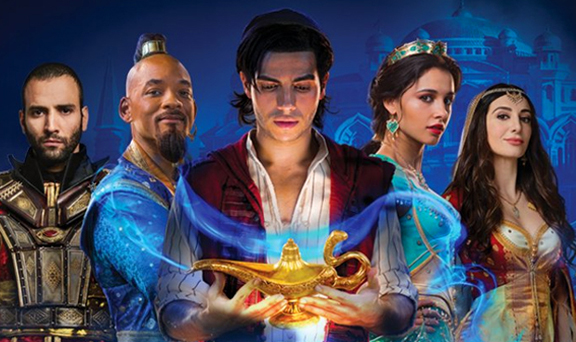By Susan JAMES
We live in a post-reality, animé-amped world so it’s only natural that the faux Aladdin would be the best Aladdin. Disney has a great trifecta going for it. Make a popular animated film, turn it into a live action movie and spin off a Broadway musical. Hello, “Lion King,” “Beauty and the Beast” and now “Aladdin.” But all productions are not equal. Where the live action “Beauty and the Beast” went above and beyond the animated version, “Aladdin” strains to break out of cartoon mode.
One thing it does have going for it are gorgeous production values. Michael Wilkinson’s eye-popping costumes in Indian silks and North African textiles leap off the screen. Hot pink and acid green are the favored tones. But the problem is the costumes are frequently more interesting than the actors who are wearing them.
You all know the story. Poor boy, thief, street rat meets princess-in-disguise slumming it in the bazaar and he yearns to become a prince to win her love. Royal father insists she marry a real prince; after all it’s the law.
Meanwhile Machiavellian vizier plots to overthrow sultan dad through the aegis of a genie who inhabits an itty-bitty living space in a brass lamp. Wishes are granted. Special effects run rampant. But the characters never grow beyond their animated predecessors. The headliners – Mena Massoud as Aladdin, Naomi Scott as Jasmine – are attractive and sing and dance with enthusiasm but their chemistry, never very strong, isn’t able to make this love story sing.
Then there is Jafar, poor Jafar. In the animated “Aladdin,” he’s a real meanie with a corkscrew beard, hypnotic eye, sinister snake staff and psychotic parrot. Here as played by Marwan Kenzari, he’s an earlier Aladdin, a street rat all grown up and turned to the dark side. His boss disrespects him and he yearns for greater power. It’s hard not to feel sorry for the guy. A new character, Jasmine’s lady-in-waiting Dalia (Nasim Pedrad, late of “Saturday Night Live”), adds some pizzazz to the proceedings with humor and a hankering for a handsome genie.
And that brings us to the star of the show, the friendly genie. Robin Williams was the genius of the lamp in the 1992 animated movie. His improvisational riffs on songs and line readings made the film, according to cartoon director Chuck Jones, “the funniest feature ever made.” The movie was light, effervescent and well-balanced. It never took itself too seriously. But the story has been passed on to film auteur Guy Ritchie, director of “Sherlock Holmes: A Game of Shadows” and “Lock, Stock and Two Smoking Barrels,” and the story has gone into dark corners and social commentary.
Jasmine as morphed from Snow White waiting for her prince to Elsa from “Frozen,” a wanna-be ruler belting out a protest song that just because she’s a woman she’s forced to be speechless. It rings in the same defiant decibels as “Let It Go.”
And then there’s Will Smith’s genie. Smith is an iconic actor and he brings some energy to the role but by casting an African-American actor in the role of a slave, all sorts of real-life issues begin to prick the fantasy balloon leaving the humor to leak out. What we’re left with is a candy-colored fairy tale infused by social realities that don’t sit comfortably together.
And oh, Mr. Williams: you are sorely missed.
See you at the movies!

